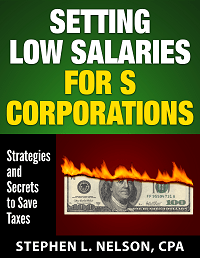 Businesses often struggle with the “S corporation reasonable compensation” question.
Businesses often struggle with the “S corporation reasonable compensation” question.
Set the number too low and you risk the wrath of the IRS. Set the number too high and you’ll pay more Social Security and Medicare tax than you need.
In this blog post, therefore, I want to provide you with five tips for setting reasonable S corporation compensation.
I can’t make any guarantees, but if you follow my tips, it’s unlikely your 1120S return gets selected for an examination. And if your return is selected, I think it’s unlikely you’ve have any serious “reasonable compensation” issues in the audit.
Maybe the best news, though, is that these tips should still let you minimize your payroll taxes.
S Corporation Reasonable Compensation Tip #1
You want to pay yourself more than the IRS reports the average S corporation in your industry pays its typical corporate officer. (I provide a link to a table of these averages we maintain at our S Corporations Explained website at the end of this post.)
For example, if the Internal Revenue Service’s own statistics report that the mean corporate officer wage for a firm in your industry equals $40,000, you want to pay yourself at least $40,000.
Note that corporate officers are not necessarily corporate shareholders. However, you will find that an IRS auditor has a tough time arguing a shareholder employee should receive more than the industry average corporate officer salary.
S Corporation Reasonable Compensation Tip #2
A second tip: Find the job within the Bureau of Labor Statistics salary database that most closely matches the actual job you perform. Then pay yourself at least the Bureau of Labor Statistics average for your job. (Start your search here: Overview of BLS Wage Data.)
If you run a construction company, for example, and at the end of the day you’re primarily a construction supervisor, make sure you pay yourself at least the Bureau of Labor Statistics average salary for a construction supervisor.
You want to use the Bureau of Labor Statistics data rather than something like payscale.com or salary.com for a couple of reasons, by the way. First, the Internal Revenue Service understandably gives more weight to statistics that come from federal government sources.
A second reason to use the Bureau of Labor Statistics database is that its numbers seem to be more realistic than those that come from salary.com and payscale.com.
A tangential remark on tips #1 and #2: If the IRS statistics say that the average corporate officer working for an S corporation in your industry makes $38,000 and then the Bureau of Labor Statistics says on average someone doing your job earns $45,000, the IRS has a tough time arguing that a salary of $45,000 is too low.
S Corporation Reasonable Compensation Tip #3
A quick third tip: do look at what your other employees get paid.
Logically, if you own and operate an S corporation, you probably should be the highest paid employee.
You probably can’t pay yourself, say, $20,000 a year if your top team members make $90,000. Sorry.
I may be reaching on this, but I think this reality is one of the subtexts that comes out of the last big S corporation reasonable compensation tax court case, David E. Watson vs Commissioner.
S Corporation Reasonable Compensation Tip #4
As much as you can, pad out shareholder-employee compensation with nontaxable fringe benefits.
For example, if your S corporation can provide shareholder-employees with health insurance, be sure to do the accounting for that health insurance correctly so it counts as nontaxable fringe benefits that save income taxes, save payroll taxes and reduce shareholder distributions—all while in effect bumping up the total compensation package for a shareholder.
Just so you understand how powerful this is, assume you have an S corporation that generates exactly $100,000 of profit for a shareholder-employee. If you call $48,000 of this amount wages, that might seem unreasonable if you take the other $52,000 of the profit as a distribution.
If you use $12,000 of that leftover $52,000 of profit to purchase health insurance for the shareholder-employee, however, the tax return reports $60,000 as shareholder wages and that leaves only $40,000 of money available for shareholder distributions.
By the way, employer matching pension fund contributions work the same way. A $15,000 SEP contribution or 401(k) contribution bumps someone’s compensation package, but without triggering payroll or income taxes.
Note that $15,000 would be the maximum allowed if someone earned a base salary of $48,000 and then received $12,000 of health insurance. Which means in a case where an S corporation earned $100,000 in profit and paid $48,000 in base wages, $12,000 in health insurance, and $15,000 in pension fund matching, the total compensation package equals $75,000.
That’s pretty good. And it leaves in our example where the total business profit equals $100,000 only $25,000 of funds available for shareholder distributions.
S Corporation Reasonable Compensation Tip #5
My final tip related to S Corporation reasonable compensation…
You ought to understand that if the IRS concludes you have not paid yourself a reasonable wage, what happens next is the IRS re-classifies shareholder distributions as wages.
But think about this for a minute… This reality means that the final thing you may want to do is to minimize distributions to shareholders.
The easiest way to minimize distributions to shareholders is to leave funds inside the corporation. You might choose to leave your rainy day fund or emergency reserves inside your corporation for example.
But there are other ways to minimize distributions to shareholders too. For example, you might make charitable contributions you would otherwise make personally from the corporation directly. If you make a $5,000 charitable contribution directly from your S Corporation, that $5,000 is not a distribution and so shouldn’t be vulnerable to re-categorization as wages.
Related Resources You Might Find Useful
Average S Corporation Salaries (a resource at our S Corporations Explained website)
S Corporations, Healthcare and Obamacare
Safe Harbor S Corporation Salaries
Paying Zero S Corporation Shareholder-employee Wages
An Ebook You Might Find Useful
Need even more information? You might be interested in our ebook on the subject of S corporation salaries. Written in plain, everyday language, our Setting Low Salaries of S Corporations ebook explains how to save thousands of dollars a year with your S corporation–but at the same time how you can do so ethically and responsibly and in a way that minimizes both the chance that your S corporation tax return will be examined and the chance your S corporation salary will be rejected by the Internal Revenue Service.
 Priced at $100, this ebook should save you thousands of dollars a year in payroll taxes. To buy and download the S corporation salaries ebook, click this button:
Priced at $100, this ebook should save you thousands of dollars a year in payroll taxes. To buy and download the S corporation salaries ebook, click this button:
Accordingly, if you want help with this tax decision, you may also want to get and carefully read my 100 page-ish, easy-to-understand ebook, Setting Low Salaries for S Corporations. But do note: If you’re a CPA firm client, you don’t need to purchase this ebook. Just email us and ask for your complimentary copy.
Click for more info or to purchase and download
A final comment. All of our monographs and ebooks come with a money back guarantee. If you don’t think what we deliver is worth the price you’ve paid, just let us know and we’ll refund your purchase price. (Refunding your purchase price, by the way, often takes a work day or two because the funds get handled manually when we’re in the office.)
Thanks, Steve, for this post. It’s the first time I’ve read this level of detail on what a small business owner, particularly a Sub-S corporation owner, should pay himself/herself – and how it can keep you out of trouble. Your five tips are a gold mine for this. The only tip you might want to add is, pay yourself what you can afford. I’ve seen ridiculous blog suggestions that actually say, across the board, $63,000 is the average annual salary for small business owners, so pay yourself that.